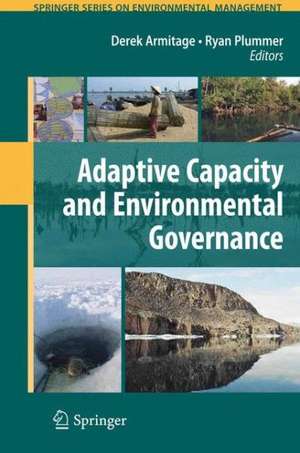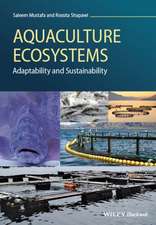Adaptive Capacity and Environmental Governance: Springer Series on Environmental Management
Editat de Derek Armitage, Ryan Plummeren Limba Engleză Paperback – 5 sep 2012
| Toate formatele și edițiile | Preț | Express |
|---|---|---|
| Paperback (1) | 945.79 lei 43-57 zile | |
| Springer Berlin, Heidelberg – 5 sep 2012 | 945.79 lei 43-57 zile | |
| Hardback (1) | 948.92 lei 43-57 zile | |
| Springer Berlin, Heidelberg – 27 iun 2010 | 948.92 lei 43-57 zile |
Din seria Springer Series on Environmental Management
- 18%
 Preț: 1230.84 lei
Preț: 1230.84 lei - 15%
 Preț: 642.18 lei
Preț: 642.18 lei - 18%
 Preț: 1236.51 lei
Preț: 1236.51 lei - 18%
 Preț: 953.82 lei
Preț: 953.82 lei - 18%
 Preț: 779.08 lei
Preț: 779.08 lei - 15%
 Preț: 642.83 lei
Preț: 642.83 lei - 15%
 Preț: 677.85 lei
Preț: 677.85 lei - 15%
 Preț: 640.06 lei
Preț: 640.06 lei - 15%
 Preț: 640.06 lei
Preț: 640.06 lei - 15%
 Preț: 635.47 lei
Preț: 635.47 lei - 15%
 Preț: 505.49 lei
Preț: 505.49 lei - 18%
 Preț: 1236.69 lei
Preț: 1236.69 lei - 18%
 Preț: 962.98 lei
Preț: 962.98 lei - 15%
 Preț: 640.06 lei
Preț: 640.06 lei - 15%
 Preț: 638.24 lei
Preț: 638.24 lei - 15%
 Preț: 634.68 lei
Preț: 634.68 lei - 18%
 Preț: 959.82 lei
Preț: 959.82 lei - 15%
 Preț: 641.03 lei
Preț: 641.03 lei - 15%
 Preț: 653.46 lei
Preț: 653.46 lei -
 Preț: 399.50 lei
Preț: 399.50 lei -
 Preț: 387.38 lei
Preț: 387.38 lei - 18%
 Preț: 950.66 lei
Preț: 950.66 lei - 15%
 Preț: 651.99 lei
Preț: 651.99 lei - 18%
 Preț: 957.62 lei
Preț: 957.62 lei - 15%
 Preț: 647.40 lei
Preț: 647.40 lei - 18%
 Preț: 1218.69 lei
Preț: 1218.69 lei - 15%
 Preț: 634.68 lei
Preț: 634.68 lei - 18%
 Preț: 1225.79 lei
Preț: 1225.79 lei - 15%
 Preț: 657.25 lei
Preț: 657.25 lei -
 Preț: 397.38 lei
Preț: 397.38 lei -
 Preț: 404.89 lei
Preț: 404.89 lei - 15%
 Preț: 641.03 lei
Preț: 641.03 lei - 15%
 Preț: 650.86 lei
Preț: 650.86 lei - 15%
 Preț: 711.21 lei
Preț: 711.21 lei - 15%
 Preț: 643.16 lei
Preț: 643.16 lei - 18%
 Preț: 724.80 lei
Preț: 724.80 lei - 15%
 Preț: 635.47 lei
Preț: 635.47 lei
Preț: 945.79 lei
Preț vechi: 1153.39 lei
-18% Nou
Puncte Express: 1419
Preț estimativ în valută:
180.98€ • 189.43$ • 150.63£
180.98€ • 189.43$ • 150.63£
Carte tipărită la comandă
Livrare economică 31 martie-14 aprilie
Preluare comenzi: 021 569.72.76
Specificații
ISBN-13: 9783642263927
ISBN-10: 3642263925
Pagini: 320
Ilustrații: X, 307 p.
Dimensiuni: 155 x 235 x 17 mm
Greutate: 0.45 kg
Ediția:2010
Editura: Springer Berlin, Heidelberg
Colecția Springer
Seria Springer Series on Environmental Management
Locul publicării:Berlin, Heidelberg, Germany
ISBN-10: 3642263925
Pagini: 320
Ilustrații: X, 307 p.
Dimensiuni: 155 x 235 x 17 mm
Greutate: 0.45 kg
Ediția:2010
Editura: Springer Berlin, Heidelberg
Colecția Springer
Seria Springer Series on Environmental Management
Locul publicării:Berlin, Heidelberg, Germany
Public țintă
ResearchCuprins
Integrating Perspectives on Adaptive Capacity and Environmental Governance.- Integrating Perspectives on Adaptive Capacity and Environmental Governance.- Adaptive Capacity in Theory and Practice.- Adaptive Capacity in Theory and Reality: Implications for Governance in the Great Barrier Reef Region.- Building Adaptive Capacity in Systems Beyond the Threshold: The Story of Macubeni, South Africa.- Learning and Adaptation: The Role of Fisheries Comanagement in Building Resilient Social–Ecological Systems.- Adaptive Capacity and Adaptation in Swedish Multi-Use Boreal Forests: Sites of Interaction Between Different Land Uses.- From the Inside Out: A Multi-scale Analysis of Adaptive Capacity in a Northern Community and the Governance Implications.- Vulnerability and Adaptive Capacity in Arctic Communities.- Climate Change, Adaptive Capacity, and Governance for Drinking Water in Canada.- Institutional Fit and Interplay in a Dryland Agricultural Social–Ecological System in Alberta, Canada.- Frontiers in Adaptive Capacity.- The Learning Dimension of Adaptive Capacity: Untangling the Multi-level Connections.- Adaptive Capacity as a Dynamic Institutional Process: Conceptual Perspectives and Their Application.- Sociobiology and Adaptive Capacity: Evolving Adaptive Strategies to Build Environmental Governance.- Building Transformative Capacity for Ecosystem Stewardship in Social–Ecological Systems.- Adapting and Transforming: Governance for Navigating Change.
Textul de pe ultima copertă
Rapid environmental change calls for individuals and societies with an ability to transform our interactions with each other and the ecosystems upon which we depend. Adaptive capacity - the ability of a social-ecological system (or the components of that system) to be robust to disturbances and capable of responding to changes - is increasingly recognized as a critical attribute of multi-level environmental governance. This unique volume offers the first interdisciplinary and integrative perspective on an emerging area of applied scholarship, with contributions from internationally recognized researchers and practitioners. It demonstrates how adaptive capacity makes environmental governance possible in complex social-ecological systems. Cutting-edge theoretical developments are explored and empirical case studies offered from a wide range of geographic settings and natural resource contexts, such as water, climate, fisheries and forestry. • Of interest to researchers, policymakers and resource managers seeking to navigate and understand social-ecological change in diverse geographic settings and resource contexts.
Caracteristici
A consolidated, interdisciplinary approach to environmental governance Highlights theoretical advances and practical implications Written by internationally recognized experts in the field For researchers, policy makers and resource managers All chapters were peer-reviewed. Includes supplementary material: sn.pub/extras











